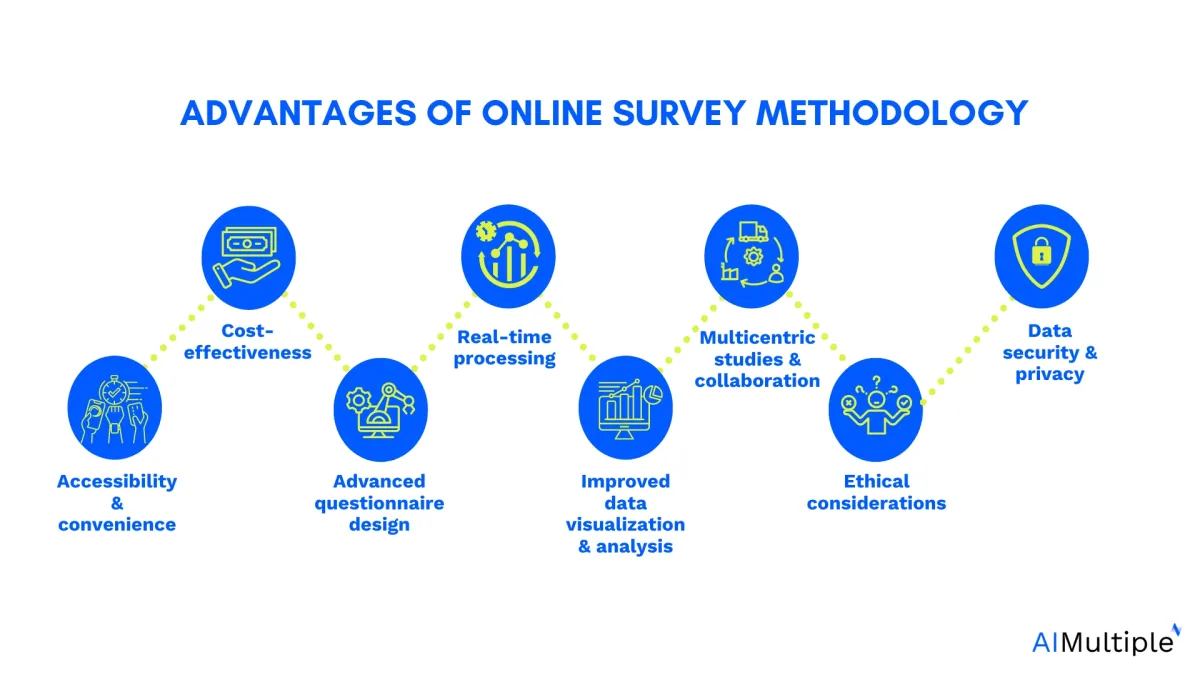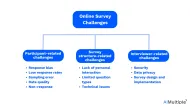Conducting survey research helps businesses collect data from customers, employees, or the public. Collecting data with traditional methods, such as paper-pencil or telephone, is costly, time-consuming, and cannot keep up with the digitally transforming world. Thanks to online survey research tools, businesses can quickly reach a broad audience’s opinion and make necessary adjustments.
Explore:
- disadvantages of traditional surveys,
- strengths of online survey methods, and
- the effect of online survey on corporate decisions
Traditional vs online survey research
Conducting surveys is a great way to understand the public’s opinion. Two approaches can be considered:
Approach 1: Instead of talking to every single person or business, you can give a survey to a representative, homogenous sample and use their answers to make predictions more generally.
Approach 2: On the other hand, if you are interested in a more specific sample, for instance, Forbes 500 CEOs, you can talk to them directly and get a grasp of their thoughts as they are a considerably small sample compared to people aged between 25-34.
Disadvantages of traditional survey methods
Traditional survey methods, such as face-to-face (F2F) interviews, paper format surveys, telephone interviews, and postal questionnaires, are widely regarded past decade for their ability to produce high-quality data, particularly in terms of representativeness. However, these methods are also associated with several disadvantages, particularly when compared to more modern approaches like web surveys:
1. High cost and time-consumption
One of the most significant drawbacks of traditional survey methods is the high cost and the time required to conduct them. F2F and telephone interviews necessitate trained interviewers, travel expenses, and extensive time for data collection and processing. This makes traditional surveys not only expensive but also slow to implement, particularly in large-scale studies.1
The logistical challenges in coordinating and managing large teams of interviewers can further complicate the process, often leading to delays in data collection and analysis.
2. Limited reach and accessibility
Traditional surveys often struggle with reaching a diverse and geographically dispersed target population. For instance, telephone interviews may not be feasible in regions with low telephone penetration, and F2F interviews can be logistically challenging in remote or rural areas. As a result, these methods may fail to capture a representative sample, particularly in low-income countries where telephone coverage is limited.2
3. Social desirability and interviewer bias
Traditional survey methods, particularly face-to-face and telephone interviews, are prone to social desirability bias. Target respondents may feel compelled to provide answers that align with social norms or the perceived expectations of the interviewer rather than their true feelings or behaviors.3
This issue is exacerbated by the presence of an interviewer, who might unintentionally influence respondents’ answers through non-verbal cues or leading questions.4
4. Cognitive and emotional burden on respondents
Traditional surveys, especially those that are lengthy or complex, can impose a significant cognitive and emotional burden on respondents. Telephone and face-to-face interviews, in particular, require respondents to process and articulate their thoughts quickly, which can lead to fatigue and reduced data quality over time.5
5. Potential for measurement errors
Traditional surveys are susceptible to various measurement errors, such as response-choice order effects, where the order in which options are presented can influence respondents’ choices. For example, F2F and telephone interviews often exhibit recency effects, where respondents are more likely to choose the last option they hear.6
6. Lower response rates for sensitive topics
Traditional surveys often experience lower response rates when dealing with sensitive topics. For instance, in F2F and telephone interviews, respondents might be reluctant to disclose information about their health, financial situation, or personal behaviors due to concerns about privacy and judgment from the interviewer.7 This reluctance can lead to incomplete data or a lack of target participants altogether, which diminishes the overall effectiveness of the survey.
Some advantages of online survey methodology
Online surveying is a very useful tool for companies as it is convenient, easy to create, cost-effective, and saves time. Online surveys can be shared with the potential participants via e-mails and social media or embedded on the company’s website.

1. Accessibility and convenience
Online surveys provide significant accessibility benefits, allowing researchers to reach a broader target audience quickly and efficiently. Survey participants can complete surveys at their convenience, which is particularly advantageous for researching internet based populations and engaging with a geographically dispersed or busy target population. This flexibility helps in collecting data from diverse groups without the constraints of physical location or time.
2. Cost-effectiveness
Conducting internet survey generally incurs lower costs compared to traditional methods in internet based populations. The elimination of printing, postage, and data entry expenses contributes to substantial cost savings. Researchers can also use various online tools and platforms to design, distribute, and analyze surveys with minimal financial investment.8
3. Real-time processing
Online surveys facilitate the real-time collection and storage of collected data. As survey responses are submitted, quantitative data is automatically stored in a central database, reducing the risk of data loss and streamlining the analysis process. This real-time survey data collection supports timely decision-making and immediate access to preliminary results.9
4. Advanced questionnaire design features
Modern online survey software offer advanced features for designing complex questionnaires. Researchers can utilize various question formats, including multiple-choice, Likert scales, and matrix questions. Tools like Survey Monkey and Google Forms provide options for page logic and question branching, enhancing the survey’s adaptability and relevance to respondents’ answers.10
5. Improved data visualization and analysis
Online survey platforms often include built-in data visualization tools, enabling researchers to easily generate charts, graphs, and other visual representations of their data. While basic data analysis can be performed directly on the platform, researchers can also export qualitative data to specialized software for more in-depth analysis.11
6. Facilitation of multicentric studies and collaboration
Online surveys support collaboration among researchers across different locations. Multiple researchers can gain access and contribute to the survey project, share survey data, and collaborate on data analysis in real-time. This capability is particularly useful for multicentric studies that require coordination across various sites.12
7. Ethical considerations and informed consent
One of the significant strengths of online surveys is the ability to implement ethical standards, such as obtaining informed consent. Researchers can present consent forms as the initial step in the survey process, ensuring that survey participants are fully aware of the study’s purpose, risks, and their rights. This method mirrors the informed consent process used in offline surveys and can be enhanced by integrating information sheets and consent checkboxes.13
However, researchers must address potential challenges, such as ensuring the security of consent data and preventing unauthorized access. Techniques like referrer verification and dynamic IP address tracking can help maintain the integrity of the consent process.14
8. Data security and privacy
While online surveys offer enhanced data security by storing data on secure servers and allowing for regular downloads to prevent data loss, researchers must remain vigilant about protecting participant privacy. This includes anonymizing data to prevent identification and ensuring that data is not accessible to unauthorized parties.15
There are different online survey methods that you can use based on your company’s needs at the moment. For instance, if you want to launch a new product targeting the 25-34 age group, high-income people, you can focus on a specific (e.g., customers between 25-34 living in New York Metropolitan Area) group and learn about their preferences, opinions, or their feedback.
How online interviews and surveys help make critical business decisions
With the insights you get from the survey results, you can:
1. Observe your products or services deeply
When you launch a new product or a service, it is always a good idea to observe the customers’ reactions, suggestions, or complaints closely to gain insights about your products or services. This can allow you to improve your least favored products or services and hear your customers’ voices to take necessary action against their complaints.
Also, check our article on why customer insights are important and learn the top 5 data sources.
2. Change marketing strategies
Let’s say that despite your great efforts and hopes for your latest product, survey results show that people did not even notice it. Then, you can check your existing marketing strategies and understand why your strategy does not work and what could be changed or implemented.
You can also check our comprehensive article on data collection for marketing.
3. Understand the trends in the market
Even though you have powerful marketing strategies that make your product or service stand out in the market, the needs and trends in the market are constantly changing, and you should keep up with them. Thus, understanding your target group’s needs, expectations, preferences, or inclinations with the surveys is crucial to keep your business strategies in line with the existing trends.
To learn more, read our comprehensive guide to survey analytics.
If interested, here is our data-driven list of survey participant recruitment services and survey tools.
Here is also our data driven list of market research tools.
Please contact us if you have any additional questions about conducting surveys:
External Links
- 1. Bowling, A. (2005). Mode of questionnaire administration can have serious effects on data quality. Journal of Public Health, 27(3), 281-291.
- 2. Szolnoki, G., & Hoffmann, D. (2013). Online, face-to-face and telephone surveys—Comparing different sampling methods in wine consumer research. Wine Economics and Policy, 2(2), 57-66.
- 3. Bowling, A., & Windsor, J. (2008). The effects of question order and response-choice order on responses to a questionnaire. Journal of Public Health, 30(2), 199-204.
- 4. Callegaro, M., & Manfreda, K. L. (2017). et V. Vehovar,«Web survey methodology». Revista española de investigaciones sociológicas, 157, 165-169.
- 5. Bowling, A. (2005). Mode of questionnaire administration can have serious effects on data quality. Journal of Public Health, 27(3), 281-291.
- 6. Bowling, A. (2005). Mode of questionnaire administration can have serious effects on data quality. Journal of Public Health, 27(3), 281-291.
- 7. Bowling, A., & Windsor, J. (2008). The effects of question order and response-choice order on responses to a questionnaire. Journal of Public Health, 30(2), 199-204.
- 8. Duffy, B., & Smith, K. (2007). The Benefits and Limitations of Online Surveys. Journal of Survey Statistics and Methodology, 4(1), 23-34.
- 9. Buchanan, E. A., & Hvizdak, E. E. (2009). Online Survey Tools: Ethical and Methodological Considerations. International Journal of Human-Computer Interaction, 25(7), 635-648.
- 10. Mahon, J. (2013). Best Practices in Online Survey Design and Implementation. Journal of Research Administration, 44(3), 67-80.
- 11. Duffy, B., & Smith, K. (2007). The Benefits and Limitations of Online Surveys. Journal of Survey Statistics and Methodology, 4(1), 23-34.
- 12. Sue, V. M., & Ritter, L. A. (2012). Conducting Online Surveys. Sage Publications.
- 13. Mahon, J. (2013). Best Practices in Online Survey Design and Implementation. Journal of Research Administration, 44(3), 67-80.
- 14. Buchanan, E. A., & Hvizdak, E. E. (2009). Online Survey Tools: Ethical and Methodological Considerations. International Journal of Human-Computer Interaction, 25(7), 635-648.
- 15. Clark, A. (2006). Anonymizing Data: Methods and Considerations. Journal of Privacy and Confidentiality, 8(2), 45-62.



Comments
Your email address will not be published. All fields are required.